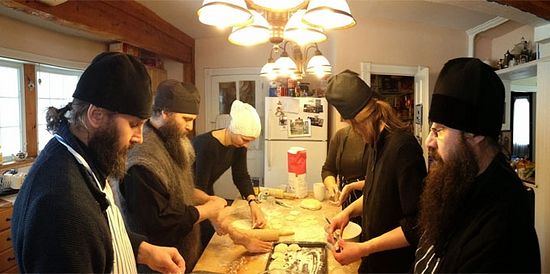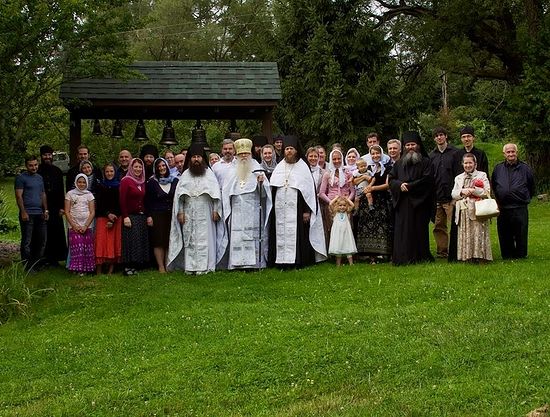“If you love, it’s always about the other”

Father Joachim, when you talk to people in church or in lectures, you constantly speak about love. Why do you pay so much attention to love in people’s life, and always begin with this theme?
The ultimate human relationship, the only really human relationship Scripture explains to us very simply: “You can do anything: do all kinds of wonderful works, take care of the sick, raise the dead, walk on the water, move mountains, but if you don’t have love—you have nothing.” Because this is what life is about—relationship. And there is no relationship without love. That’s what we have to care for—the other person. To care for the well-being of another more than of yourself. So, love requires that you come out of yourself. Love requires that you don’t love yourself, but you love the other person. Love is the only truly human act; it is freedom from isolation. Everything we do as human beings is about self-love, love of God, or love of another. Self love is destructive, it isolates you, makes you individual, locked into your world, worrying about everything. Love of God and your neighbor makes you come out of yourself. The reason I talk about love is because Christ talked about love. Christ came because, as it says right at the very beginning, “God so loved the world that He gave His only begotten Son.” The only reason for Christ’s being here is love, and He came to teach us to love. But we don’t know how. People say: “Oh, I have to love myself, have to worry about this, worry about that,” and I say to them: “In the four Gospels, given to us to guide us, there is not one place—in the four Gospels!—where you hear Jesus Christ say, “I command you to love yourself.” There is, “I command you to love one another. You must love the Lord your God with all your heart, all your soul, all your mind, and all your strength, and love your neighbor as yourself,” but nothing about love of yourself! God says that we must love our enemies! The whole message of Christ is about love—love of God, of neighbor; it is about relationship, and nothing about love of yourself. So, it’s impossible to talk about God or Church, even about man and not talk about love. That’s why I talk about love all the time.
And you emphasize that people really don’t know how to love. We don’t really even know what love is.
In the time before the fall, Adam and Eve lived in the garden of Paradise in the constant, conscious awareness of God and His presence—they were not out of His presence. When they began to turn to themselves, began to think of themselves and start to take that awareness of God, that love of God, their relationship with God and turn it into “what about me”, then they fell into sin, they became proud and disobedient. So, man no longer lives in constant connection with God and has to struggle to find that connection, because man lost the awareness of God. Man has to work hard now and struggle to get it back. It happened because we became self-centered instead of God-centered. So, it’s all about us now. And because it’s all about us, all relationships are difficult. Every relationship we have with any human being is difficult because we’re thinking about ourselves. We say: “I love you—DO YOU love ME? You promised, but you didn’t do this! You didn’t do this, didn’t do that!” It’s all about ourselves. That’s why we have to learn to love. Love always comes with care for the other, not care for yourself. If you love it’s always about the other, not about you. If it’s about you, it’s love of yourself. If you were in a room of ten people and you said, “I love everyone in this room except that person,” it means that you don’t love one out of ten. Do you really love anybody? Of course not! The only one you love is yourself. If you love people according to how you judge them, according to how they respond to you—it’s really just about you. We have to be guided by God—to love everyone without distinction—no difference! It’s not someone’s actions or appearance, it’s not what he promises—it’s who he is. Who are you and who am I? You are God’s child, you are the one that God loves, and He also loves me. There are other views, as well. I cannot say: “I don’t love him,” because I don’t love you either—I just love me. That’s why love is always about God, without God there is no love. You can’t say: “I love my husband, but I don’t know God.” No, you don’t love your husband, you love yourself and you have no idea who your husband is, or even who you are. We have to help people come to the awareness that the only true human relationship is love of God and love our your fellow man.
In your opinion, what’s the most important problem in spiritual life nowadays?
Selfishness. It’s self-obsession, I must say. The awareness is always of yourself—everyone else is just who gives something to you or who takes from you. If people give you what you want, you will take them into your awareness, if they don’t, you keep them out. Because it’s always about how you feel, how you look, what you want, are you important, do people care about you, do you look good—all those kind of things. You can’t take your mind off yourself. But the Lord says: “Do you love the Lord your God with your whole mind?” How can you be obsessed with yourself and love God? It’s not possible. Your mind is on yourself, you’re going first of all against God, Who says: “Love Me with all your mind.” But you say: “No, no, no, I love me and I’ll give You, God, some space in my life.” The Lord doesn’t answer to that.
Why is this happening to us? What should people do to avoid and banish selfishness from their souls?
It has always been that way; it is nothing new. It came with the fall of Adam, when we lost the immediate, conscious awareness of God because of sin. Instead of realizing that the desire man has to be connected, to be full, to be whole and complete, happens in God, we try to find it in someone else—in someone we find attractive, someone we love. But nothing happens. We are always looking for things to fulfill us. There is always one thing missing, and that is God. That’s where the wholeness of relationship comes—with God. So, since the fall, man is searching all the time for that. Everyone has the feeling that there is something missing. You don’t know what it is, you’re looking, you get caught up in this thing, you get bored and go for something else and get bored that that, and so on. Then you meet somebody and you think the whole world has become wonderful, but you start to find flaws, start not loving. It all happens because no one can give you what God can give. We can never find the connection until we find God.

The only way to not be selfish is to learn to love others. You can never stop being selfish when you are focused on your life. I suggest to anybody who struggles with loving others and who is very selfish, to give me a call and I will teach you to love: I will take you to your suffering brothers and sisters and you will learn that you help yourself by helping them. When you give a sandwich to a man who is hungry on the street, YOU receive the blessing, not him. Because you gave to someone in need—YOU will be changed. When you go to a hospice where people are dying and you wash them, clean up their messes and their mouths so they can swallow, you will see that there is another person inside—the body is not who they are. It will change your vanity, you will no longer think of yourself the way you do. We have to understand that we have a wrong understanding of ourselves. The soul is who we are. Who you are is WHY you live, not HOW you live. Today people need to break the chains of self-love and selfishness, and they will do it by sacrificing themselves, by giving to others, by being servants; but it’s not easy. You learn how dreadful and small you are when you are thinking only of yourself. When you walk down the street, someone might point to a man and say, “Look at that drunk!” But you must say: “Look at our brother! He’s sad and lonely, he’s lost, he’s drunk, but he’s our brother! How can we walk past him?” If you should see your real brother or sister drunk and lying on the sidewalk, what would you do? You wouldn’t leave him, and you would still love him.
But it’s difficult sometimes not to be angry with that brother or sister who always does things like that—not working, taking drugs, alcohol—even if you love him.
Let’s imagine that one day the doctor tells you that you have cancer. You announce this news to your family and they say: “Oh, it’s a problem, you will ruin our life, we had different plans, we don’t want to have to deal with you because you’re sick; let’s go away.” They don’t want to accept that and they leave you. So, when your brother has a problem with alcohol or despair, it’s not understandable, it’s embarrassing. Your brother is suffering, even though he is doing it to himself. If I have a burn on my arm and it is painful, you feel sorry for me, right? But if I have a knife and am jabbing myself, you’ll cry, “You’re making yourself hurt! Stop it!” Well, the pain is the same! Your brother is suffering, but you only see what it does to you and it embarrasses you. You are angry because he won’t change. He’s abusing everybody; you try to do something, but nothing changes and you don’t see that he is sick. You lost sight of your brother, and all you see is the problem. You have to see your brother! When was the last time did you told him you love him? You have to love him, he’s suffering. It’s difficult, but it’s no reason not to love. God waits, He is there, no matter what you do it doesn’t change His love. God loves you no matter what! Nothing you do can stop God’s love. That’s the main example—we have to take it from God, we have to learn how to love. You learn to love not by what you do, but in spite of what you do. It may be hard because we don’t understand love; we think that love is about us.
You accepted Orthodoxy in 1970. What was the main reason for your decision?
There’s no main reason, there’s only one reason—it’s a development. With Orthodoxy I found the early Apostolic Church as it was lived during time the apostles lived in the first hundred years of the Church. That same desire, that same level of purpose is still only alive in Orthodoxy. The idea of the connection to the Apostolic Church, of obedience to the fathers of the Church, of the inheritor of the Ecumenical Councils, of the purity of our faith—all stayed the same. Not everybody in the Church has attained this, not everybody in the Church even knows what it’s about; but that doesn’t mean the Church is not that way. The Church as a body has kept the faith pure.
In the Roman Catholic Church, from which I came, the consciousness of that early Apostolic Church, of the link and tradition that traces back to the fathers, and staying on the clean path got very confused in the Middle Ages with scholasticism—in the 13th century and later. It all shifted from the holy traditions to taking philosophy as the basis for understanding theology, and using the philosophers to explain the Church’s existence. Only the Orthodox Church has preserved the religious traditions. Of course, for me it was a big struggle, because when I came to the Orthodox Church, many members of that Church had no idea what I was talking about. Even though they grew up in the Church, they had never heard about early Apostolic Church, and didn’t even understand it. They said to me: “Why are you here? You’re not Russian. This is our Church.” And I said: “If it’s your Church, I’m leaving. It has to be Christ’s Church of which we both are part. If you are an Orthodox Christian simply because you were born Russian and were baptized in your early years, that doesn’t make you any more Orthodox then I am, though I wasn’t born Russian and was baptized some years later. It’s Baptism that makes us Orthodox—not nationality.”

So, I came to the Orthodox Church, and it was wonderful and difficult at the same time. It was wonderful because it was what I looked for all my life. It was difficult because I had to embrace Orthodoxy with the culture that presented it. If you want to drink some water, you need a container. Liquid has to be contained—without something to hold it, it disappears and goes away. Russian culture and practice hold the faith, but it’s hard to see that water without seeing the glass holding the water as well. Sometimes people confuse the glass for the water. We’re confusing Orthodoxy with the practices of a Local Church. For example, on the Sunday before Easter—Palm Sunday—I was in a parish located in a place where all kinds of trees grew, including palm trees. But people said to me: “We must only use pussy willows—that is the Church. Palm Sunday means pussy willows! This is Orthodoxy!” I said: “At the time of Christ they didn’t use pussy willows. They used palms and all kinds of branches. Here we are, living in an area where there are palms and all of kinds branches, but you insist on having pussy willows, because that’s the only thing that grows in Russia in the spring. Is this Orthodoxy? It’s craziness!” So, I used palms and other branches, and people became even more furious: “You’re denying our faith! You’re changing the Church!” They didn’t get it, and that was a big struggle in the beginning for me. I’m over that now and I understand the difficulty.
Christians aspire to be missionaries. What exactly should we do and what is the principal mission of the Orthodox Church?
The mission of the Church was given to us by Christ: to go forth, to teach all nations who God is, baptizing them in the name of The Father and Holy Spirit. That’s the directive of Christ. It is to bring people to the way to the Father; and Christ is the way, the truth and the life. The mission of the Church is to bring all people to salvation, to teach who Jesus Christ is. An Orthodox Christian who doesn’t believe that Jesus Christ is the way, the truth, and the life is not in the right way. You have to believe before you can give it to somebody else; you have to make it part of your life. Missionaries have to be Christians first. And the Church has a mission—to bring Christ to everyone. People say, “All religions are the same, it doesn’t matter how we believe.” Of course it matters!
Regarding social services: I think it is very unfortunate that in most cases they relieve you of the relationship, take you away from the opportunity of engaging with your brothers and sisters who are suffering. You put money in the box, buy food or something and say: “I gave my charity, I did my part. I helped a school and a hospital.” But you never see the person. You are paying for yourself. You give money to feel better, not because you love your brother or care about him.
What do you think is the biggest social disease in Russia? What do you see everywhere around you? I think the biggest disease nowadays is loneliness. Almost everybody is lonely; people can’t stand silence, can’t stand being alone, because they are empty and frightened. Young people take drugs and alcohol to not feel the pain. They have music to distract them from thinking. They use video and visual things, they have sex, but not relationships, they have money, toys, and work themselves to death—so that they never have to be alone. Loneliness is the biggest sickness in our society. And it’s there because we’re not in a relationship with God, with our brothers, and ourselves. We are scared to death.
The Church is quite simple—it is following in Jesus Christ’s steps. What did He do? Why did He come? What must we do to attain eternal life? Christ said very clearly: “Whatever you do to your brothers and sisters you do to Me. When I was hungry you didn’t give Me food, when I was thirsty you gave Me no drink, when I was in prison you didn’t come to visit Me, when I was lonely you didn’t come to see Me”. And they said: “When, Lord, when were You ever in prison? When You were ever hungry?” And the Lord answered: “Whenever your brother was hungry or thirsty, in prison, alone, naked, or homeless—that was Me and you didn’t help Me.” That’s the command of Christ. If we want to see His face we have to love our brothers. He said: “He who sees Me, sees the Father.” We can extrapolate it and say: “If you see Christ in your brother, you see Christ.” If you recognize in Jesus Christ the Father, then you will recognize in your brother Jesus Christ. That’s how you can see the face of Christ. If you cannot see Him in your brother, you will never see Him. That is why we suffer. Why is the Church so disconnected from society? It’s because we don’t hear the message. You live in Moscow, where the majority of people between age fifteen and forty are not interested in church, they don’t even think about it.
People often say: “God is in my soul, that’s enough for me…”
And they don’t need a church, right? They could just as well say, “The food is in my stomach, I don’t need to eat.” Or: “The air is in my lungs, I don’t need to breathe.” What nonsense! It’s just an excuse for not doing anything. The faith is a relationship; it doesn’t exist by itself. Those people love themselves, they are individuals and deny the fact that they must be in relationship with their brothers. They say: “I love everybody! I love God. God is in me, I don’t need a church.” It’s nonsense! What they mean is: “I don’t want to make sacrifices, I don’t want to be a part of it, I want to just live my own life the way I want.”
Some people say that it’s too early for them to go to the church, they are too young for this, even if they are forty or fifty years old.
I’d say—you better run! It may be too late! Can they guarantee that they will be here tomorrow? They only hope they will be here. But what if God calls them tomorrow? What are they going to say? Sorry, Lord, I was waiting, I didn’t want to give my life to You, I was too busy, I’m too selfish, I just love myself. We must put fire into people like that. Invite them to have tea with me and we’ll talk about it (laugh).
Sometimes we grow cold toward receiving Communion, going to church out of habit. It happens all the time. Everybody has his ups and downs in spiritual life. Once I heard an incredible thought that we Christians must always have a fire in our souls, deep within our hearts. How should we keep up this fire?
We have to desire God and the church and at the same time we have to do whatever is necessary to keep that desire alive. Take young women for example: they desire to look better because they have vanity. They avoid things they don’t need, they want to be in a good shape, and are continually careful about staying slim. Women want to be beautiful; that drives them, they never forget about that. They get up in the morning, wash their faces, put on some makeup, make their hair and go to work. They don’t forget about these things, they don’t get up and go outside with their hair all messed up or in rumpled clothes, because they have an image that they know they must keep up—they want to look presentable. So, that’s how we have to love God: always have that consciousness, always have Him in our mind. People don’t forget about how they look, but they do forget about prayer, about God, about loving their brothers, only because they focus on themselves. They have the energy, they have the drive, but it’s going to the wrong place—to themselves.
Why is it so difficult to pray for contemporary people?
Modern man wants to be distracted and entertained. He doesn’t want to sacrifice, or to give—he’s concerned only with what pleases. Prayer is about God, not about us. Prayer is a conscious awareness that God is present. We don’t make God present; He is always present, He is present here right now and we have to be aware of that—He’s here with us. That’s what prayer is—living in the presence of God, speaking to God with your soul, your life—everything is focused on Him. Let’s say you are giving this interview in a big hall with hundreds of people. You can’t see everybody because the light is on the stage, but you know people are out there on their seats. And a man you just met a month ago and were madly in love with (you think about him all the time) says he wants to come to the interview. You say: “No way! You can’t be there because I’ll be thinking about you throughout the interview. I’ll be nervous and think about how I look, what am I doing, etc”. It’s because your life is focused on him. That’s the kind of relationship we have to get with God. But we don’t, we focus on ourselves or someone other than God.
Honor, morality, and dignity are ever decreasing and devaluating nowadays. We can constantly hear: “You must be aggressive, selfish, individual, and take everything you can from life”. How should Christians react to what’s going on? What must parents do to preserve in their children basic values, which are so often destroyed in a world without God?
Again we come back to Christ. He said: “You have to be in the world, but not of the world.” You cannot have the values of the world if you want to be a Christian. The Christian is the opposite of the world’s view. The world according to spiritual life is the state of man after the fall of Adam—how we are spiritually after Adam’s fall. I mean the spiritual life, spiritual reality. Since the fall, man has suffered terribly because he doesn’t understand the message of the Gospel—it’s difficult for him, man only understands his own selfishness. The Gospel, Christ tells us, does not have a value system of the world. As Christians we cannot live as the world lives; if we do, we’re not Christians.
The Gospel gives quite a different view, but we don’t know it and we don’t keep the values of the Gospel. Therefore people get lost. They think: “Why should I help someone in the street who doesn’t work, or who drinks? I work all the time, why should I give money to him if I know he’s going to use it for drugs? The answer is: Why should God allow you to live when you never do what He tells you? Why should God allow you to wake up in the morning, when you love no one but yourself? Because He loves you! Love reaches beyond a man’s behavior to what he is. What it is all about! We only see what happens to us, how we will benefit—that’s how we judge everything. When you don’t know God, when you don’t have relationship with Him, you make yourself God. It doesn’t matter what God says; you don’t even know what He says. It only matters what you like or don’t like.
Some people say: “I don’t believe in God, who cares about who I sleep with? What difference does it make, if I don’t hurt anybody? I smoke, I use heroin, I drink—who cares? I don’t bother anybody but myself! I pay my bills; what’s wrong with that?” “I am” is the completeness of my existence; I’m not in a relationship with anybody but me. I don’t rely on God, I don’t know anything about God—I only do my own thing. This all ends up in wars, broken families, hatred, and running from one relationship to another.
People’s lives are full of emptiness. You can’t take the values of the world if you want to be a Christian. The Lord says: “Love your enemy.” How can you kill your enemy if you love him? We believe that possessions are greater than people; that wealth is more important than serving and caring for your brother. Each man is become his own god. It is all about relationship—there are no relationships between people these days. If your mother tells you that she needs help, needs some money, you will help her, won’t you? But if a stranger tells you that, what will you do? You will say, “Don’t you work? Don’t you have a place to live?” Correct? You wouldn’t be immediately open and helping because you don’t have a relationship with this man. But when you have that relationship, your whole life is different. The reason we are immoral, the reason we do not take care of the world is because we’re not in relationship with each other.
Father Joachim, what do you think of all the current discussions about doing away with confession before Communion?
If we didn’t sin, we wouldn’t have to go to confession. People say, “Why do I have to go to confession?” The answer is—you need to change your life, you need to be conscious of how far you are from God, aware that your prime relationship is not with God. Therefore you are sinning, by not loving God with your whole heart, your whole soul and whole mind. As you come to confession, saying: “I desire to be better, but I’m broken, I don’t succeed.” Confession is not just telling your sins—it’s having an immediate connection with Christ in a special way. He’s there to help you to get straight and do the right thing. You go and say: “Lord, here I am again; I tried and I forgot, I struggled and I gave up. Forgive me so I can be with You”.
You come to your husband and say, “Can you help me?” He says: “Sure, what do you need?” And you say: “I’m really not feeling well, the kids are too much right now. Can you pick up the following things from the store tomorrow after work?” “Yes, sure!” He answers. So, he comes home the next evening and… he forgot! He didn’t want to forget, he just had so much to do that he forgot to go to the store. He has to say he’s sorry, that it doesn’t mean he doesn’t love you—that’s confession.
Why is forgiveness a real problem for human beings sometimes?
Because of pride: “You did it to me, why should I forgive you? You hurt me, lied to me—you didn’t think about me, you thought about yourself. I’m angry at you, I won’t forgive you!”
But it’s really hard sometimes… we can forgive inside our heart, but we don’t want to see this person every day.
That’s not forgiveness! It’s like saying, “I don’t go to church, because God is in my heart.” If a man is starving to death and I don’t give him any food, do I love him? No! I say, “Don’t worry, I love you in my heart! Don’t die, it’s okay!” We have to ask forgiveness and not be proud. Our pride—that’s the problem. If person asks us to forgive him and we don’t, we look like a fool, and if somebody doesn’t ask for forgiveness he looks like a fool too. The Lord said: “If you don’t forgive your brother I will not forgive you!”
Sometimes it’s hard for older people to forgive quickly; they insist that their age gives them the privilege not to ask for forgiveness.
It is because they know nothing about loving others. They are saying, “What about me?”
Is there any difference between Russian and American Orthodox Christians?
No, there’s no difference, man is man everywhere. And the reason is that we’re human beings. Being Russian or American or German has nothing to do with it—“Are we Orthodox?” That is the question. There are many Russians who aren’t Orthodox, they only call themselves that; and there are many Americans who are not Orthodox, but call themselves Orthodox. If you don’t live the Gospel, if you don’t give what you are supposed to give to Christ and to your brothers, you are not Orthodox. It doesn’t’ matter if I wear a cross around my neck or dress like I do—if I don’t love, if I don’t see my brother, if I don’t forgive my enemies—I’m not Orthodox. I’m a Pharisee. It’s a problem, because we don’t know how to love.
It’s all about love…
Love is all there is! Even the Beatles sang that!
Abba Dorotheus wrote that love is the bridle for irritation. Irritation is a big problem too.
That is not to say, “Because you love, you’ll never be irritated.” It means that if you try to love and you are proud, full of self-love, everything will irritate you. Love never causes us to be irritated; it’s love of self that causes all destruction.
What is real beauty?
Beauty is anything of God’s creation. Beauty is about God, not man. If a person is beautiful, it’s because he or she shows you God, not because they are physically desirable. Physical desire is not beauty—it’s lust. It’s “what can I get from that”? You don’t value what you see as beautiful, you want to possess it, take it to yourself because it pleases you. But real beauty makes you see something greater than yourself and something greater than a person—you see God in all that. When you go out to the countryside and you see a beautiful forest, you don’t say: “I want to buy it, cut down all the trees and have it to myself!” You say: “Glory to God, it’s just incredible!” But there are some people who say: “I have to own it! For no one to see it but me!” That’s not beauty, that’s greed. Usually when we see a beautiful woman walking down the street, we don’t think: “Glory to God! What a wonder God is!” We think: “How can I get her come to me?” A woman dresses beautifully, so that someone might say, “Oh, she looks good and I want her!” It’s not about how she is reflecting God’s beauty—she is trying to attract someone to want her. We forgot what it’s all about—it’s all about God. There’s nothing other than God, this world is nothing—it’s only God.
Even in church, women are often afraid of age, of getting older.
I look at them and say: “My dear, soon it will all be over! This is simply corruption! Just let it happen.” Covering your face with all that junk is not going to stop you from dying. Clean up the inside, don’t worry about the outside—it’s a wreck, it’s over with. Older men flirt with young girls! I say to them: “What’s wrong with you people? It’s so ridiculous!” We have a man in our parish who, when he was young was very good looking—physically fit and attractive. Now he’s almost sixty and he sits with young girls in the cafeteria. He sees himself as a sixteen years old boy. One of those ladies, a very sweet and good girl, said to him, “You’re so cute, I like older men.” He was crushed—she sees him as an old man.
This man is suffering.
Of course he is! All his life he was trying to be desirable, trying to find the value, get pleasure, but not relationship. He has a wonderful wife, but he doesn’t see it.
Some young girls and women in middle age try to be attractive, young, and beautiful, and they always think about their appearance. There is a whole industry that increases this kind of stuff—botox, plastic surgery to changes lips and noses, etc.
No wonder! We can’t walk to the city without seeing all these commercials—faces, bodies, and beauty. It’s just ridiculous, but people don’t understand that. I’ll tell you a funny story. I was giving a talk in Canada to a gathering of young professionals. The ones who ran the program were TV commentators; they did news, and are very well known in Canada. There were film people, actors and actresses, rich people. And there was a young man in good shape; he is a football star in his country. He had a girlfriend with him. He was about twenty-seven and she was about twenty-one. The girl was wearing a very short dress, her arms exposed; but it was a dress, as I understood later. She was told that this is not appropriate for church, but she said, “They told me not to wear paints and to wear a dress, so I’m wearing a dress!” It was funny, because she was so obscene and didn’t see it. She didn’t see how inappropriate it was to come to the church like this, she was coming to display herself and be noticed. And there were other women with makeup all over their faces. Everyone looked at them, but they didn’t get that they were ridiculous at that moment. It’s a big problem—people afraid of death. But there is no reason to be afraid of death because they don’t have life now, they don’t have connection to life, which is Christ; no relationship with God and with other people. So they panic: “I have nothing to give, I’m physically old, I’m dying— and then what?”
How must we react to the situation in Syria, where we can see numerous murders, tortures, kidnappings of Christians, destruction of holy shrines? It’s a huge, painful wound on Christian hearts all over the globe.
It’s a huge problem, and it’s politics. It’s a sign of society’s illness. I have very strong feelings on nationalism and war. I think nationalism is not a good thing. Today, whether we like it or not, we live in a global reality. How much you are paid at work, whether or not you have electricity in your house, whether or not you’re going to eat or drink today or tomorrow—all depends on the economy across the world. Not just in Russia. Russia doesn’t control the world, it doesn’t control itself—we all are part of it. And therefore we live in a world of reality, but we don’t think about it. The reason that Syria is under attack now is because of money, the economy, and power. It’s because one group wants to control oil and people to get what they want. It’s not about religion or God. These people don’t even know who God is. We put ourselves in that situation by playing control games.
Christians must always feel joy in their souls, always be joyful. But there are so many problems, sorrows, grief in the world and in our personal lives.
Absolutely—we always must be joyful and grateful. God’s presence is joy. The main sign of Christianity is joy. Why would you not be overjoyed if you are connected to God?
So, we must always keep strong hope in our hearts?
Hope is the understanding of the promise that God will come. God promised, and if you do what He says, if you love others, you’ll have eternal life. And then you will realize that hope in your life.








Father Joachim is a schema-archimandrite. He is a monk, a spiritual father of many lay and monastic people. He is the person whose life is dedicated to God and serving the neighbor, and living according to the Gospel. Why would we not listen what he has to say? Why wouldn't we want to learn from him? And please, do yourself a favor, and check your information before slandering a person.
In Christ,
Love your neighbor as yourself, that's pretty much commandment to love yourself too, you can't love others as yourself if you don't love yourself in the first place.